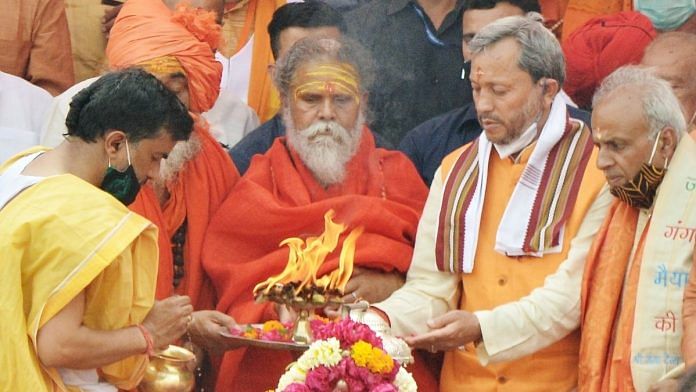
New Delhi: In a bid to appease aggrieved saints, Uttarakhand Chief Minister Tirath Singh Rawat has promised to review the Char Dham Devasthanam Management Board takeover of the state’s Char Dhams and other key shrines.
According to the announcement Friday, the new CM will reconsider the Char Dham Devasthanam Management Act 2019, which was passed by his predecessor Trivendra Singh Rawat to form the board and take control of 51 religious institutions. The law was upheld by the state high court last year.
The law became a major flashpoint between the former CM and the Hindu saint community, which is influential in deciding the politics of Uttarakhand.
On Friday, Tirath Singh Rawat announced the move to reconsider the law as the Vishva Hindu Parishad (VHP) held a meeting in Haridwar and passed a proposal seeking relinquishing of government control on temples across the country.
The body held the meet to decide if it was going to launch an agitation against the Uttarakhand government to withdraw the Act. A number of temples had also registered their protest against the state takeover earlier.
According to a source, however, Rawat attended the meeting to seek blessings of the saints on his birthday.
CM’s assurance at VHP meeting
The meeting of the Margdarshak mandal, the VHP’s highest decision making body, saw the participation of top leaders of the organisation, and saints and seers.
According to a VHP statement, the saints expressed their anger against state control over temples.
In the course of the meeting, Swami Chinmayananda Saraswati and other saints warned the government that the acquisition of temples should be stopped.
The resolution passed on the issue said the mandal is of the opinion that only Hindus should have control over Hindu temples in the country. It said necessary changes are required in the constitution regarding management of temples and the mandal expects the government to make suitable laws to ensure there is no government control over Hindu temples.
During the meeting, Rawat gave an assurance that the state law will be reconsidered.
How the law came about
In December 2019, then chief minister Trivendra Singh Rawat passed a bill through the state assembly to take over the management of 51 temples in the state including Kedarnath, Badrinath, Gangotri and Yamunotri.
According to the former CM, the establishment of the temple board would clear the mess around donation. It would also develop shrines on the lines of Vaishno Devi temple, Jagannath Puri temple and Tirupati Balaji temple.
However, priests and saints publicly decried the decision. The saint community affiliated with the VHP opposed the Uttarakhand Bharatiya Janata Party (BJP)’s move.
Many petitioners approached the court. Prominent among them was BJP MP Subramanian Swami, who challenged the law. However, the Uttarakhand High Court found the law constitutional.
The issue became so sentimental that after Rawat’s resignation earlier this year, several saints and priest celebrated his ouster.
Hindu belief system and politics around it
On Friday, the VHP told the CM that in Dev bhoomi (as Uttarakhand is also referred to), saints and priests have a right to govern their temples.
VHP president Alok Kumar, who was present in the meeting, told ThePrint, “The chief minister has told us that the government will review the decision of the former CM and we believe the government.”
He added, “We have told the CM that Hindu money should be used for Hindu temples and administration and management should be with temple priests and committee.”
He added that temples are belief systems of Hindus and any government interference in management should be akin to disturbing the Hindu belief system.
Gangotri shrine priest Rajnikant Senwal expressed happiness and told ThePrint that the new CM has rectified the fault and “we hope the BJP government will protect the interests of Hindus and priests, and not work against them”.
According to a senior BJP leader, the new decision came after Tirath Singh Rawat was told by the party to correct the decision that caused resentment among masses, MLAs and saints at the earliest since they are electorally crucial.
He added that Haridwar has a major influence on not just VHP but the Rashtriya Swayamsevak Sangh too. Moreover, the city-based Swami Ramdev and other prominent people also control large parts of religious politics. “Any chief minister can’t run annoying these leaders,” he said.
Other issues raised in VHP meet
The VHP statement Friday also said that the CM announced making the Kumbh region liquor- and meat-free too.
“Saints and seers demanded that in all places where Kumbh is organised, liquor and meat should not be allowed. They asked that if there are slaughterhouses in the area they should be closed,” said VHP national spokesperson Vinod Bansal.
The mandal also welcomed the court order regarding the Kashi Vishwanath Temple. In the meeting, several demands were made including declaration of Ram Setu as a national monument and bringing in a law for “love jihad”.
“Efforts should be made to resolve the issue of religious conversion that pose a threat to the unity and integrity of the country,” the statement said.
(Edited by Amit Upadhyaya)
Subscribe to our channels on YouTube & Telegram
Why news media is in crisis & How you can fix it
India needs free, fair, non-hyphenated and questioning journalism even more as it faces multiple crises.
But the news media is in a crisis of its own. There have been brutal layoffs and pay-cuts. The best of journalism is shrinking, yielding to crude prime-time spectacle.
ThePrint has the finest young reporters, columnists and editors working for it. Sustaining journalism of this quality needs smart and thinking people like you to pay for it. Whether you live in India or overseas, you can do it here.